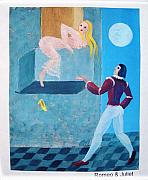"A woman's face with Nature's own hand painted
Hast thou, the master-mistress of my passion;
A woman's gentle heart, but not acquainted
With shifting change, as is false women's fashion;
An eye more bright than theirs, less false in rolling,
Gilding the object whereupon it gazeth;
A man in hue, all 'hues' in his controlling,
Much steals men's eyes and women's souls amazeth.
And for a woman wert thou first created;
Till Nature, as she wrought thee, fell a-doting,
And by addition me of thee defeated,
By adding one thing to my purpose nothing.
But since she prick'd thee out for women's pleasure,
Mine be thy love and thy love's use their treasure."
- William Shakespeare, Sonnet 20
Shakespeare says that the subject of this poem has the appearance of a gentle woman, however she is not greatly affected by matter that would typically be considered emotional; thus, Shakespeare begins comparing her to a man. This poem reminds me of the scene where Lady Macbeth calls upon the the spirits to "unsex" her. Since she is a woman, others don't expect the treachery that she is capable of; however, she is a very evil character despite her lovely outer shell.
However, as we continue to read the sonnet, we realize that Shakespeare is lamenting about his love for a woman that prefers other women. Nonetheless, it is interesting to note that Shakespeare used a similar characterization for the woman in the sonnet as he used for Lady Macbeth.
